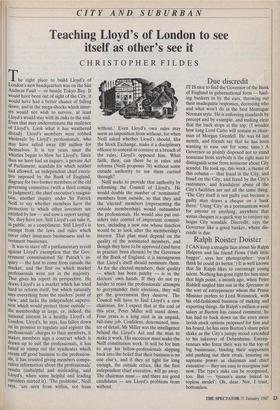CITY AND SUBURBAN
Teaching Lloyd's of London to see itself as other's see it
CHRISTOPHER FILDES
The right place to build Lloyd's of London's new headquarters was on the San Andreas Fault — or beside Tokyo Bay. It would have been out of sight of the City, it would have had a better chance of falling down, and in the mega-shocks which insur- ers would not wish to survive, at least Lloyd's would stay with its risks to the end. Even that may underestimate the resilence of Lloyd's. Look what it has weathered already. Lloyd's members were robbed wholesale by Lloyd's professionals, who may have salted away £80 million for themselves. It is ten years since the whistles began to blow for Lloyd's. Since then we have had an inquiry, a private Act of Parliament, scandals for which neither had allowed, an independent chief execu- tive imposed by the Bank of England, disgrace for two former members of the old governing committee (with a third coming to judgment), the chief executive's resigna- tion, another inquiry under Sir Patrick Neill to say whether members have the protection to which other investors are entitled by law — and now a report saying: No, they have not. Still Lloyd's can take it, in public, as a compliment. Still Lloyd's is exempt from the laws and rules which cover other insurance businessess and in- vestment businesses.
It was to stave off a parliamentary revolt against Lloyd's exemption that the Gov- ernment commissioned Sir Patrick's in- quiry — the first to come from outside the market, and the first on which market professionals were not in the majority. That gives his report its perspective. He draws Lloyd's as a market which has tried hard to reform itself, but which naturally sees everything from the insiders' point of view, and lacks the independent supervi- sion which would protect those outside the membership at large, or, indeed, the national interest in a healthy Lloyd's of London. Lloyd's, he says, has fallen down on its promise to regulate and register the professionals' charges to their members, it makes members sign a contract which is drawn up to suit the professionals, it has failed to stamp out the syndicates which Cream off good business to the profession- als, it has resisted giving members compa- rative information about the professionals' results (unhelpful and misleading, said Lloyd's, when some helpful and leading outsiders started it). The problems', Neill says, 'are seen from within, not from without.' Even Lloyd's own rules may seem an imposition from without, for when Neill asked whether Lloyd's should, like the Stock Exchange, make it a disciplinary offence to conceal or connive at a breach of the rules, Lloyd's opposed him. What faith, then, can there be in rules and reforms (Neill proposes 70) without some outside authority to see them carried through?
Neill seeks to provide that authority by reforming the Council of Lloyd's. He would double the number of 'nominated' members from outside, so that they and the 'elected' members (representing the outside membership) would outnumber the professionals. He would also put out- siders into control of important commit- tees, including a new one whose function would be to look after the membership's interest. That plan must depend on the quality of the nominated members, and though they have to be approved (and have in practice been chosen) by the Governor of the Bank of England, it is incongruous that Lloyd's itself should nominate them. As for the elected members, their quality — which has been patchy — is in the electors' own hands. If they do not try harder to resist the professionals' attempts to gerrymander their elections, they will get the government they deserve. The Council will have to find Lloyd's a new chairman, for I expect that at the end of this year, Peter Miller will stand down. Four years is a long stint in an unpaid, full-time job. Confident, determined, mas- ter of detail, Mr Miller was the intelligence behind the Lloyd's Act and the man to make it work. His successor must make the Neill constitution work. It will be for him to stop his fellow-professionals slipping back into the belief that their business is no one else's, and if they sit tight for long enough, the outside critics, like the first independent chief executive, will go away. The chairman must — and there are good candidates — see Lloyd's problems from without.



































 Previous page
Previous page